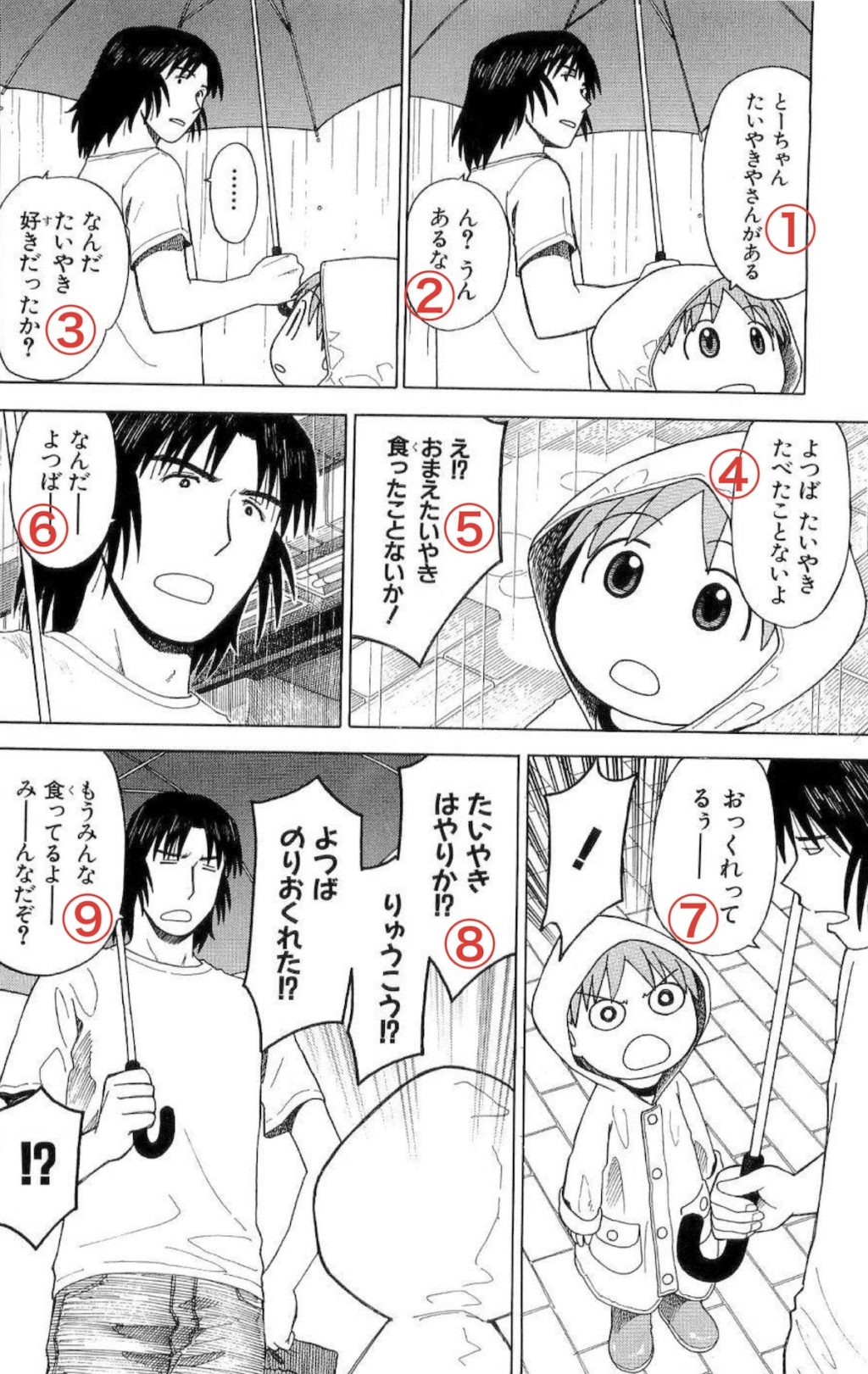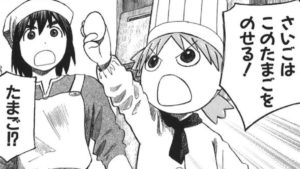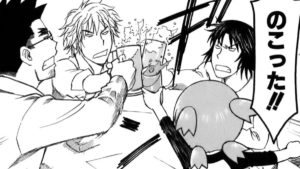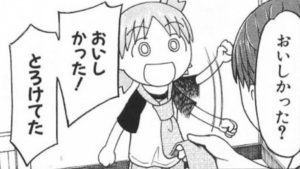Let’s learn Japanese with our analysis of manga. We will analyse a manga snippet from Yotsubato! (よつばと!) Volume 5.
CONTENTS
Manga Snippet
Sentences
Mouseover (tap on a smartphone/tablet) to reveal the censored romaji and English translation.
-
とーちゃん たいやきやさんがある
tōchan taiyaki-ya-san ga aru
Daddy, there is a taiyaki stand. -
ん?うん あるな
n? un aru na
Hm? Yeah, there is. -
なんだ たいやき好きだったか?
nan da taiyaki suki datta ka?
What, did you like taiyaki? -
よつば たいやきたべたことないよ
yotsuba taiyaki tabeta koto nai yo
I’ve never eaten taiyaki before. -
え!? おまえたいやき食ったことないか!
e!? omae taiyaki kutta koto nai ka!
Eh?! You have never eaten taiyaki?! -
なんだーよつばー
nan dā yotsubā
Whaaat, Yotsubaaa. -
おっくれってるぅー
okkuretterū
You are behind the times! -
たいやき はやりか!? りゅうこう!? よつば のりおくれた!?
taiyaki hayari ka!? ryūkō!? yotsuba noriokureta!?
Is taiyaki in?! Trendy?! Did I miss the trend?! -
もうみんな食ってるよー みーんなだぞ?
mō minna kutteru yō mīnna da zo?
Everyone has eaten already! EVERYONE!
Analysis of Manga
-
「とーちゃん たいやきやさんがある」
- とーちゃん (noun) – daddy
- たいやき (noun) – taiyaki (fish-shaped pancake with red bean filling)
- や (suffix) – shop, stand
- さん (suffix) – shows one’s sense of respect, politeness or intimacy
- が (particle) – indicates subject
- ある (verb) – there is (for inanimate objects) EXAMPLES
-
「ん?うん あるな」
- ん? (interjection) – hm?
- うん (interjection) – yeah, right
- ある (verb) – there is (for inanimate objects)
- な (particle) – expresses agreement in males speech; yeah, you’re right EXAMPLES
-
「なんだ たいやき好きだったか?」
- なんだ (expression) – used when something is unexpected, surprising or disappointing; what?
- たいやき (noun) – taiyaki (fish-shaped pancake with red bean filling)
- 好き (na-adjective) – favourite
- だった (auxiliary) – was
- か (particle) – indicates question (when used in casual speech, it sounds masculine)
-
「よつば たいやきたべたことないよ」
- よつば (noun) – name of the main character meaning four (よつ) leaves (ば)
- たいやき (noun) – taiyaki (fish-shaped pancake with red bean filling)
- たべた (verb) – ate
- ことない (grammar) – have never done before, have no experience EXAMPLES
- よ (particle) – used to make the listener aware of the information
-
「え!? おまえたいやき食ったことないか!」
- え!? (interjection) – huh?!, eh?!
- おまえ (noun) – you (used toward equals or inferiors in male speech)
- たいやき (noun) – taiyaki (fish-shaped pancake with red bean filling)
- 食った (verb) – ate (blunt and masculine way of saying 食べた)
- ことない (grammar) – have never done before, have no experience
- か (particle) – expresses that you are impressed, surprised, moved, etc.
-
「なんだーよつばー」
- なんだ (expression) – used when something is unexpected, surprising or disappointing; what?
- よつば (noun) – name of the main character meaning four (よつ) leaves (ば)
-
「おっくれってるぅー」
- おくれてる (verb) – late to the trend, behind the times
- っ – expresses a small pause to make it sound rhythmical in order to make fun of someone
-
「たいやき はやりか!? りゅうこう!? よつば のりおくれた!?」
- たいやき (noun) – taiyaki (fish-shaped pancake with red bean filling)
- はやり (noun) – trend, craze
- か (particle) – indicates question (when used in casual speech, it sounds masculine – Yotsuba is speaking like a boy)
- りゅうこう (noun) – trend, craze (a bit more formal than はやり)
- よつば (noun) – name of the main character meaning four (よつ) leaves (ば)
- のりおくれた (verb) – fail to get on, miss (a train etc.)
-
「もうみんな食ってるよー みーんなだぞ?」
- もう (adverb) – already
- みんな (noun) – everyone
- 食ってる (verb) – has eaten (blunt and masculine way of saying 食べてる) EXAMPLES
- よ (particle) – used to make the listener aware of the information
- みーんな (noun) – EVERYONE (emphasised by using a long vowel)
- だ (auxiliary) – makes a sentence declarative (attached to a noun or na-adjective)
- ぞ (particle) – indicates emphasis in male speech
Examples
Noun + がある (there is …)
千葉県には何があるの? – 成田空港と東京ディズニーランドがあるよ。
chiba-ken ni wa nani ga aru no? – narita kūkō to tōkyō dizunīrando ga aru yo.
What is in Chiba prefecture? – There is Narita airport and Tokyo Disneyland.
コーヒーと紅茶があるけど、どっちがいい?
kōhī to kōcha ga aru kedo, docchi ga ii?
There is coffee and tea but which one would you like?
な (expresses agreement in males speech)
お父さん、このラーメンおいしいね! – うん、おいしいな。
otō-san, kono rāmen oishii ne! – un, oishii na.
Dad, this ramen is delicious, isn’t it! – Yeah, it is delicious.
若い頃、二人でよく海に行ったよね。- うん、行ったな。
wakai koro, futari de yoku umi ni itta yo ne. – un, itta na.
When we were young, we often went to the beach together, didn’t we? – Yeah, we did.
In female speech, ね is used instead of な.
Ta-Form + こと(が)ある/ない (have experience/no experience)
芸能人に会ったことある?
geinōjin ni atta koto aru?
Have you ever met celebrities?
ウィスキーって飲んだことないけど、おいしいの?
wisukī tte nonda koto nai kedo, oishii no?
I have never drunk whiskey before but is it good?
もう + Te-Form + いる (to have already done something)
今どこにいるの?私はもう駅に着いてるよ。
ima doko ni iru no? watashi wa mō eki ni tsuiteru yo.
Where are you now? I have already arrived at the station.
急いで!もう映画が始まってるよ!
isoide! mō eiga ga hajimatteru yo!
Hurry up! The movie has already started!
In colloquial speech, い is often omitted. (〜ている → 〜てる)
Support Easy Peasy Japanesey
If you enjoy our content, please consider supporting Easy Peasy Japanesey. Your support will help keep us going. Thank you for your support!



